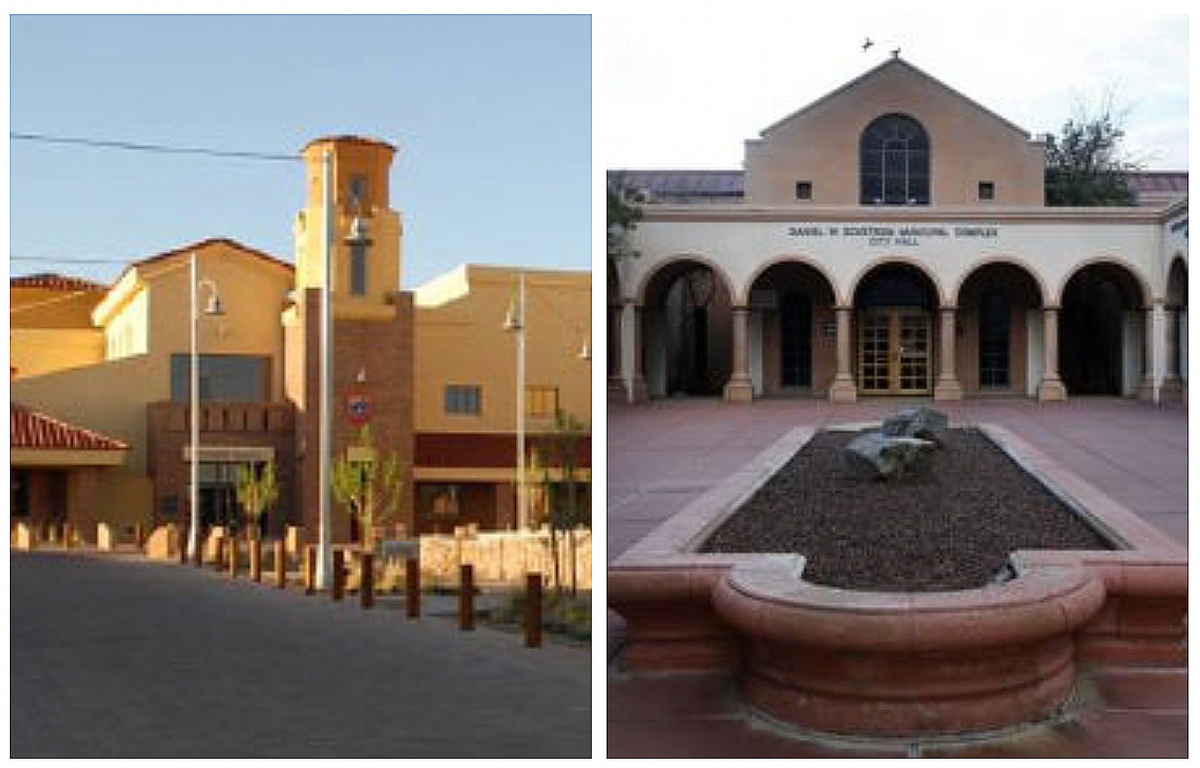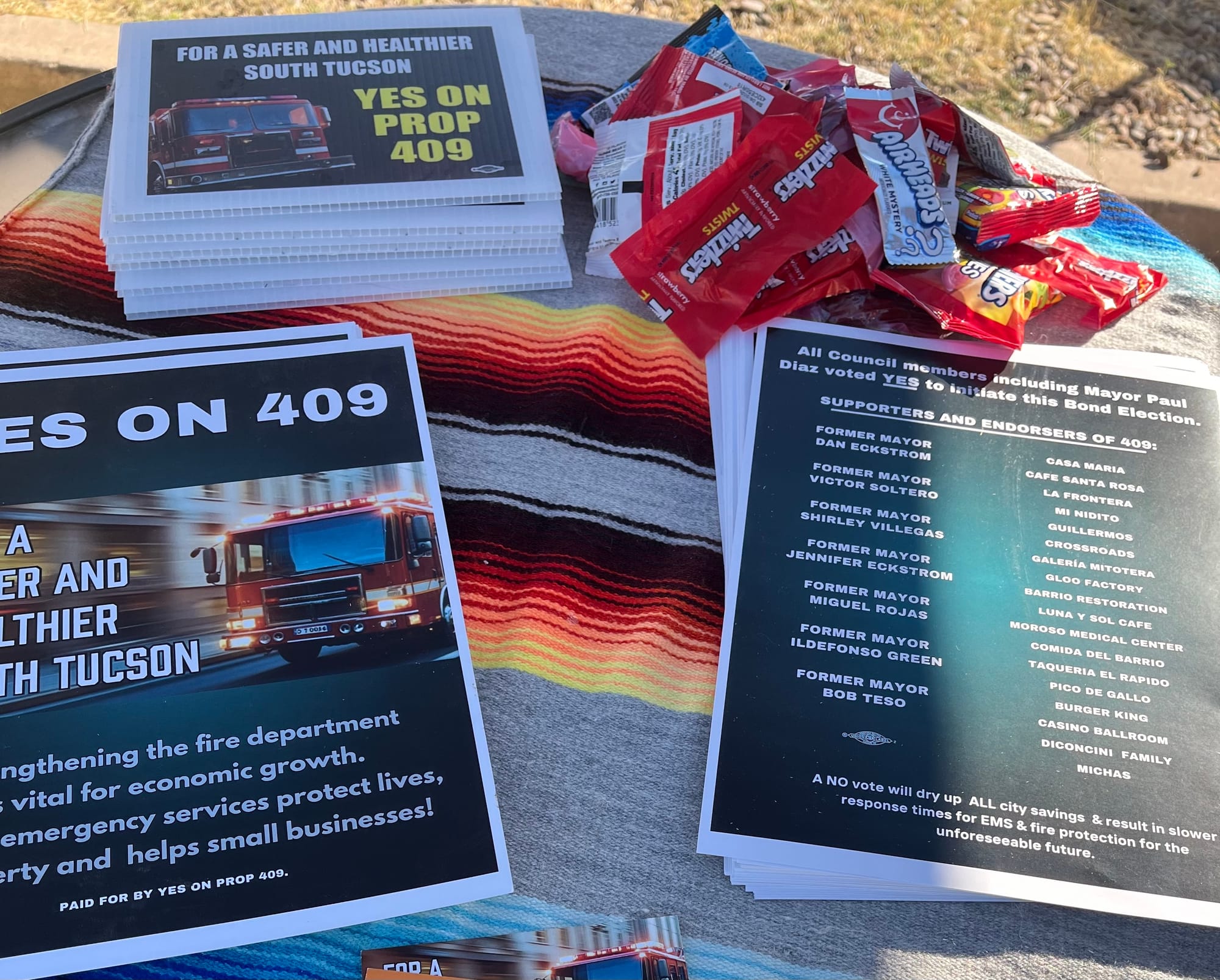Breaking down the Sahuarita and South Tucson ballot measures
Sahuaurita voters will find five questions on their ballot, including Proposition 403 for a $66 million bond. Over in South Tucson, voters will be asked to approve two propositions, one for a $6 million bond.

In addition to the dozens of races and statewide ballot initiatives, voters in Sahuarita and South Tucson will also be deciding on several propositions that will help shape their future.
Sahuaurita voters will find five questions on their ballot, including Proposition 403, which would authorize the town to issue and sell up to $66 million in general obligation bonds, and four additional propositions about utility franchise agreements for natural gas and water.
Over in South Tucson, voters will be asked to decide on Propositions 408 and 409. A “yes” vote on Prop 408 will extend the town’s alternative expenditure limit and Prop 409 would authorize the town to issue and sell up to $6 million in general obligation bonds.
Information about the Sahuarita bonds was easy to find on the town’s website, but we had to take a trip to the South Tucson Municipal Complex to pick up a copy of the publicity pamphlet, after a city employee confirmed that it was not available online.
While voter information pamphlets are mailed to everyone registered to vote with the Pima County Recorder’s Office and Arizona Secretary of State, they’re also typically available in an online format.
“I have no idea (why it’s not available online),” Mayor Paul Diaz told Tucson Spotlight, adding that he knows of at least three voters who didn’t receive the guide in the mail.
He later clarified that those voters were himself, his wife and his son, who all live at the same address.
Here’s what you need to know about the various propositions:
Prop. 403- Sahuarita
What will it fund?
The $66 million in bonds will be used to fund Sahuarita’s parks and recreation, police and public safety, and infrastructure projects.
The planned list of projects to be financed with the bonds include:
- A $48.6 million multigenerational recreation center
- $1 million in trails development
- $2.10 million in improvements to Anamax Park Field
- $2.97 million for a sports court complex
- A $7.5 million police department building expansion
- $4.94 million for a public works maintenance building
- $7 million in remodels to expand and improve the town hall
- $1.89 million in contingency to use on any of the projects
The town also plans to contribute $10 million from the general fund for the projects.
How will this impact taxpayers?
Sahuarita homeowners currently only pay a primary property tax. If Prop. 403 were approved, the town would collect a secondary property tax to repay the bonds.
For a home valued at $250,000, the annual estimated cost is $252.92 per year for 25 years, or $6,323 in total cost.
What happens if it’s not approved?
If voters don’t approve Prop 403, the projects described above may remain unfunded and not built or scaled down to reflect the available funding.
What are people saying?
Sixteen people submitted letters of support for Prop. 403. There were no letters of opposition.
Sahuarita Mayor Tom Murphy wrote that the bond package will help the town maintain its record of fiscal responsibility and careful preparation for the future.
“By issuing bonds now for these projects, we can start construction sooner, take advantage of lower current costs, and spread the payments over time, much like a home mortgage,” Murphy wrote.”As our community grows, new residents will also contribute to the repayment, making it a fair and sustainable investment for everyone.”
Sahuarita resident Brett Lee wrote that the recreation projects funded through the bonds will not only improve the quality of life for current residents, but also help draw attention to the town.
“The investment in infrastructure improvements will make our town more attractive to potential homeowners and businesses, which could increase both residential and commercial property values,” he wrote. “A rise in property values can generate higher tax revenues, which can be reinvested in further community improvements, creating a positive cycle of growth and development.”
Kara Egber, Sahuarita’s vice mayor, wrote that the cost of the bond to homeowners is less than the monthly cost of two McDonald’s Big Mac meals.
“A comprehensive recreation center that caters to the diverse needs of Sahuarita's residents across different age groups is essential,” wrote Carlos Valles, executive director of the Sahuarita Food Bank and Community Resource Center. “Currently, there is a lack of recreation centers of this scale in the area that are accessible to the public, leading many families to commute to Tucson for similar programs.”
Valles wrote that the recreation center would offer residents a space to enjoy activities all year long and also would help foster a sense of community and promote overall well-being.
Prop. 404, 405, 406 and 407- Sahuarita
Propositions 404 through 407 are franchise agreements to provide utility services to residents. Prop 404 establishes an agreement with Southwest Gas Corporation. Prop 405 is an agreement with the Community Water Company of Green Valley, Prop 406 is an agreement with Global Water—Farmers Water Company, Inc and Prop 407 with Global Water—Las Quintas Serenas Water Company, Inc.
If approved, the franchise agreement with Southwest Gas would go into effect on July 27, 2025 and remain in place for 25 years, until 2050.
If voters approve the franchise agreements with Global Water—Farmers Water Company, Inc., Global Water—Las Quintas Serenas Water Company, Inc., and the Community Water Company of Green Valley, they would become effective November 6 and remain in place for 25 years, until 2049.

Prop. 408- South Tucson
Prop 408 would extend South Tucson’s alternative local expenditure limitation.
In 1980, Arizona voters approved a tax reform package that placed an expenditure limitation on cities and towns, which limits their budgets to the state-imposed expenditure ceiling. This means cities and towns can only spend a certain amount of their total budget to pay for government services.
But residents can vote to approve an exception to the state-imposed expenditure limitation amount, which allows municipal governments to determine their own expenses based on their own budget needs.
Every four years, a city or town seeking to adopt their alternative expenditure limitation must present the option to local voters. In South Tucson, voters have approved the alternative expenditure limitation since 1989.
If approved by voters, the city estimates it will be allowed to expend approximately $16.37 million in the 2025-26 fiscal year, $16.78 million in 2026-27, $17.7 million in 2027-28 and $18.65 million in 2028-29.
Prop. 409
What will it fund?
The $6 million in general obligation bonds will pay for vehicles and equipment for the fire department and repairs and renovations to the fire station.
It will also free up general fund money to be used to pay for fire protection and emergency medical services by paying off the 2019 financing, which refinanced the costs of various city obligations.
How will this impact taxpayers?
South Tucson homeowners currently only pay a primary property tax. If Prop. 409 were approved, the city would collect a secondary property tax to repay the bonds.
For a home valued at $250,000, the annual estimated cost is $396 per year for 19 years, or $7,156 in total cost.
What happens if it’s not approved?
If voters reject Prop 409, the projects may remain unfunded and not completed or scaled down to reflect the available funding.
The city would continue to provide fire and emergency medical services under its current funding model using ongoing general fund money generated by sales tax and other operating funds.
What are supporters saying?
There were three letters written in support of Prop 409, with all the letter writers involved in local government.
South Tucson City Councilmembers Roxanna Valenzuela, Brian Flagg and Cesar Aguirre wrote that approving the bond is vital for the safety of the community.
“By passing this bond, we can provide the necessary funds to upgrade our fire department’s equipment, helping our dedicated firefighters meet today’s safety standards and deliver the best service possible,” they wrote. “Let’s come together as a community, not to cut down our fire department, but to boost its ability to protect our families and neighbors.”
Arlene Lopez, a South Tucson Advisory Committee member, wrote that fire protection is essential and the bond would guarantee a fully-staffed, fully-equipped fire station.
Lifelong South Tucson resident and former Mayor and Councilman Dan Eckstrom wrote that he supports Prop 409 based on his 32 years of service to South Tucson and Pima County.
Eckstrom was involved in the bond advisory committee, a group of residents, community and business leaders who discussed the issue with professional advisors and unanimously recommended it to the city council.
The funding “is so very important to the safety, health and wellbeing of each and every child, family member and senior citizen who resides in South Tucson,” he wrote. “By voting yes, you will be providing critically needed funding.”
There were no letters in opposition of either Prop 408 or 409, but Mayor Paul Diaz told Tucson Spotlight that he’d be voting “no” on both.
He didn’t provide a further explanation, but Diaz often votes against Valenzuela, Flagg and Aguirre during meetings and filed a recall application against all three last month, citing a series of allegations.
Caitlin Schmidt is Editor and Publisher of Tucson Spotlight. Contact her at caitlin@tucsonspotlight.org.
Angelina Maynes is a journalism major at the University of Arizona and reporter with Tucson Spotlight. Contact her at angelinamaynes@arizona.edu.
Tucson Spotlight is a community-based newsroom that provides paid opportunities for students and rising journalists in Southern Arizona. Please support our work with a paid subscription.



